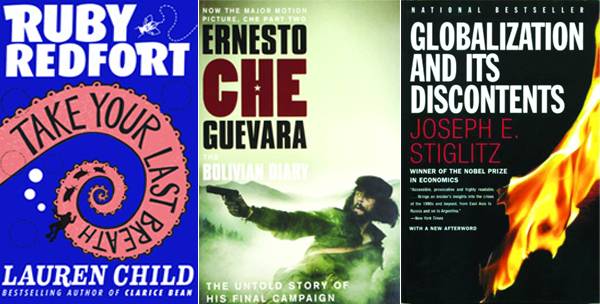
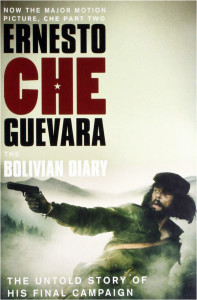
The Bolivian Diary
Ernesto Che Guevara
Harper Perennial (paperback), 2009
PRs 800
With an introduction by Fidel Castro
Che Guevara’s famous last diary, found in his backpack after he was captured by the Bolivian Army in 1967, and which played a pivotal role in catapulting him to iconic status after his death.
In 1967 Che Guevara left Cuba to lead the Bolivian Liberation Army. In the jungles of Bolivia they attempted to initiate a revolution like that in Cuba, in which Che had played such a central role. This fascinating diary describes the troubled guerrilla campaign until Che’s final entry on the 7th October 1967 – the day before his capture by the CIA-backed Bolivian Army and his execution.
Following the phenomenally successful film adaptation of ‘The Motorcycle Diaries’, two of Che Guevara’s later and most insightful diaries are being brought to the big screen in 2009. Directed by Steven Soderbergh and starring Benicio del Toro, ‘Reminiscences of the Cuban Revolutionary War’ and ‘The Bolivian Diary’ will be released as ‘Che Part 1’ and ‘Che Part 2’.
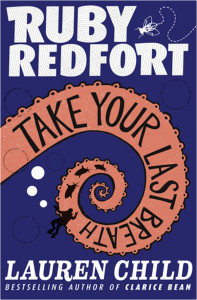
Ruby Redford Take Your Last Breath
Lauren Child
Harper Collins (paperback), 2014
PRs 800
Everyone’s favorite girl detective is back for a second mind-blowing installment, packed with all the off-the-wall humor, action, and friendship of the first book. This time, though, it’s an adventure on the wide-open ocean, and Ruby is all at sea… Can she crack the case of the Twinford pirates while evading the clutches of a vile sea monster as well as the evil Count von Viscount? Well, you wouldn’t want to bet against her.
Review
The sequel to Ruby Redfort: Look into My Eyes (2012) won’t disappoint readers who enjoyed the wit, irony, and creativity of Clarice Bean’s favorite girl detective. As the book opens, Spectrum agent Ruby is at dive school in Hawaii, confronting one of her few fears (claustrophobia) and ignoring the sharks around her. Back home in Twinford, you can be sure both these elements will resurface—along with pirates who are trying to kill her parents, messages sent over Muzak radio stations, a peculiarly potent sea monster, family legends featuring brave little girls and large gemstones, and the return of evil Count von Viscount. Our favorite characters are all here: the smooth butler Hitch, irascible but devoted housekeeper Mrs Digby, and Ruby’s best friend Clancy Crew. Graphics include musical scores, maps that organize ideas and events, and Morse code. It’s as if James Bond met Nancy Drew met Harriet the Spy, and it works most effectively, complete with appendixes that discuss code breaking in music, text, and graphics. Three cheers for a determinedly wholesome mystery series that doesn’t talk down to its tween audience. - Booklist
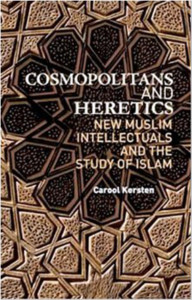
Cosmopolitans and Heretics: New Muslim Intellectuals and the Study of Islam
Carool Kersten
Hurst (paperback), 2011
PRs 4771
Contemporary critiques of Islam focus more on politics and the rise of extremism than on the development of liberal alternative discourses, which have gained impressive traction among Muslim intellectuals in recent decades. These individuals now engage their Islamic heritage in more creative ways, understanding Islam in the comprehensive terms of a civilization rather than in the strict terms of a religion, and deploying relevant theories from the Western human sciences to build a more expansive history.
Cosmopolitans and Heretics examines three of these individuals and the controversy, if not outright accusations of heresy, their work has produced: Nurcholish Madjid, Indonesia’s most prominent public intellectual; Hasan Hanafi, one of Egypt’s leading philosophers; and the influential French Algerian historian Mohammed Arkoun. Grounding their reading of the Islamic tradition within modern, Western religious scholarship, these figures counter narrow conceptions of a monolithic Islam with their cosmopolitan attitudes. Underscoring the global dimensions of a new Muslim intellectualism, this volume is a welcome and necessary addition to the intellectual history of the modern Muslim world.
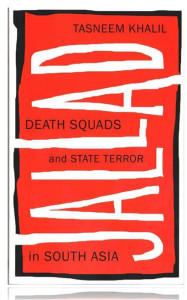
Jallad: Death Squads and State Terror in South Asia
Tasneem Khalil
PlutoPress (paperback), 2015
PRs 1395
Throughout South Asia, people live in fear of death squads, from the Rapid Action Battalion of Bangladesh to the “encounter specialists” of India, army units in Nepal, the Frontier Corps of Pakistan, and the “men in white vans” of Sri Lanka. Their tools are disappearance, torture, and summary execution, and their supporters, Tasneem Khalil shows in Jallad, are the governments of these nations—and their patrons, like the United States, the United Kingdom, China, and Israel.
An unsparing indictment of an international system of terror that is fully countenanced by the West, Jallad presents close-up, detailed accounts of incidents of state terror and targeted violence throughout South Asia.
halil, a reporter who himself endured torture at the hands of agents in Bangladesh, and whose remarkable story was featured in the New York Times, draws on countless hours of on-the-ground reporting and a broad network of activists and human rights advocates to build an undeniable portrait of the domination and repression that lies at the very core of statecraft in South Asia. Shielded by their protectors in the developed world, the perpetrators of these abuses deploy them strategically to silence dissent and crush opposition.
A brave, essential work of reporting and investigation, Jallad brings these horrific acts to prominence in order to make it impossible for Western governments to continue turning a blind eye to the human rights violations of their erstwhile allies.
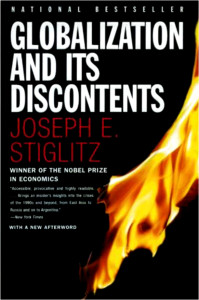
Globalization and its Discontents
Joseph Stiglitz
Penguin (paperback), 2003
PRs 795
This powerful, unsettling book gives us a rare glimpse behind the closed doors of global financial institutions by the winner of the 2001 Nobel Prize in Economics.
When it was first published, this national bestseller quickly became a touchstone in the globalization debate. Renowned economist and Nobel Prize winner Joseph E Stiglitz had a ringside seat for most of the major economic events of the last decade, including stints as chairman of the Council of Economic Advisers and chief economist at the World Bank. Particularly concerned with the plight of the developing nations, he became increasingly disillusioned as he saw the International Monetary Fund and other major institutions put the interests of Wall Street and the financial community ahead of the poorer nations. Those seeking to understand why globalization has engendered the hostility of protesters in Seattle and Genoa will find the reasons here. While this book includes no simple formula on how to make globalization work, Stiglitz provides a reform agenda that will provoke debate for years to come. Rarely do we get such an insider’s analysis of the major institutions of globalization as in this penetrating book. With a new foreword for this paperback edition. Those seeking to understand why globalization has engendered the hostility of protesters in Seattle and Genoa will find the reasons here. While this book includes no simple formula on how to make globalization work, Stiglitz provides a reform agenda that will provoke debate for years to come. Rarely do we get such an insider’s analysis of the major institutions of globalization as in this penetrating book.

